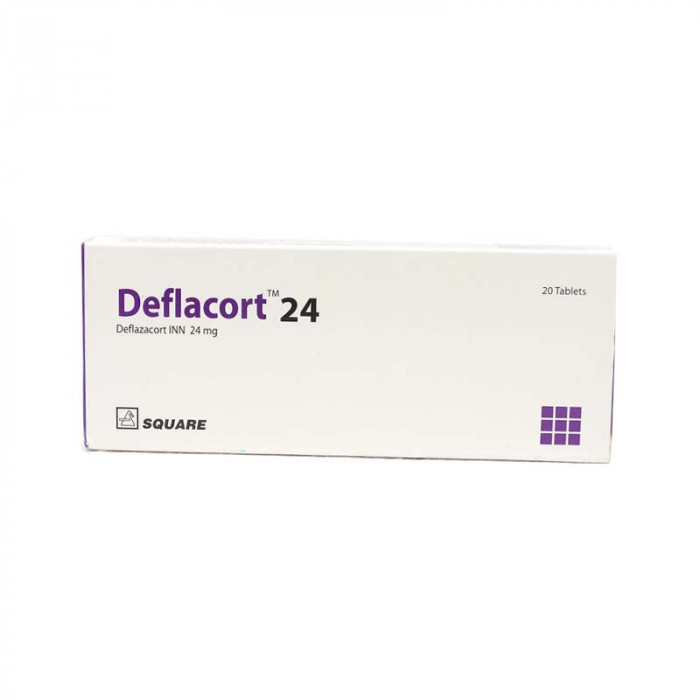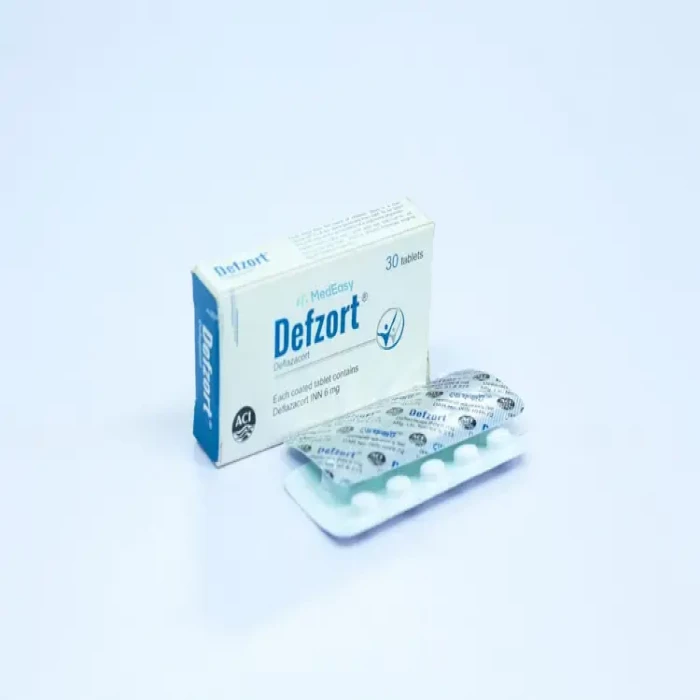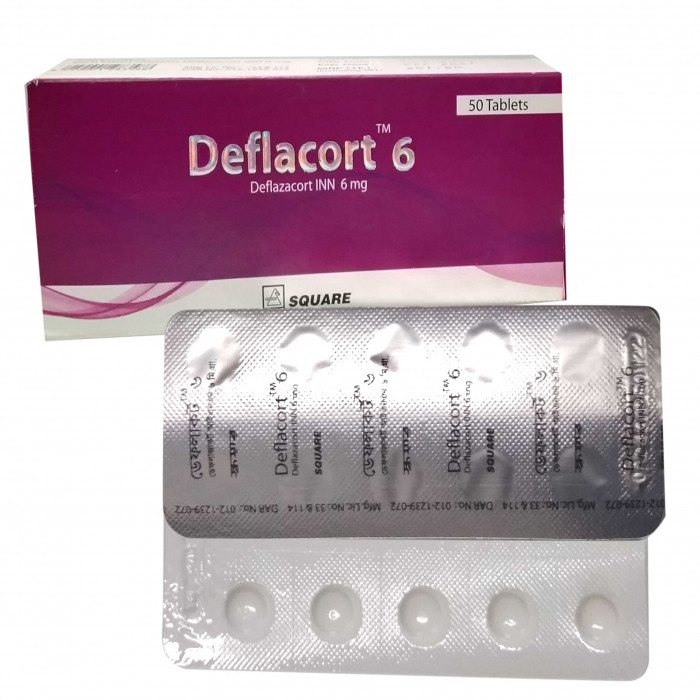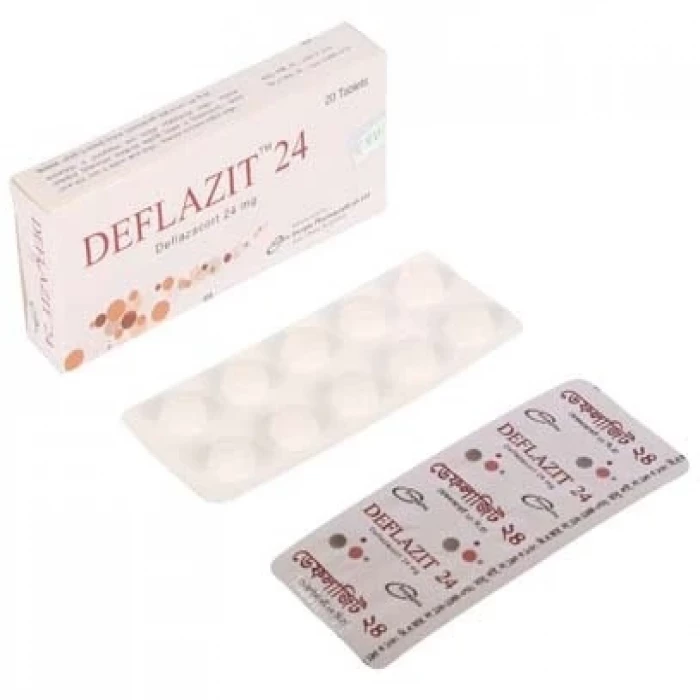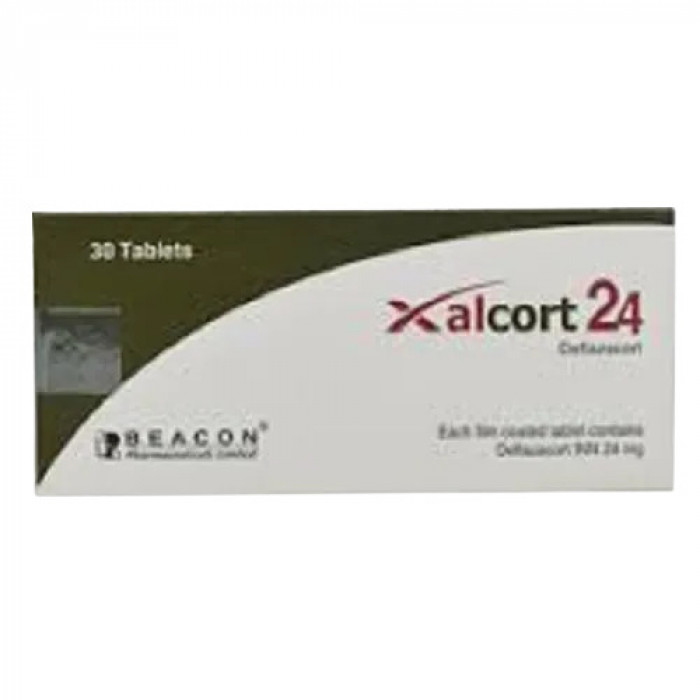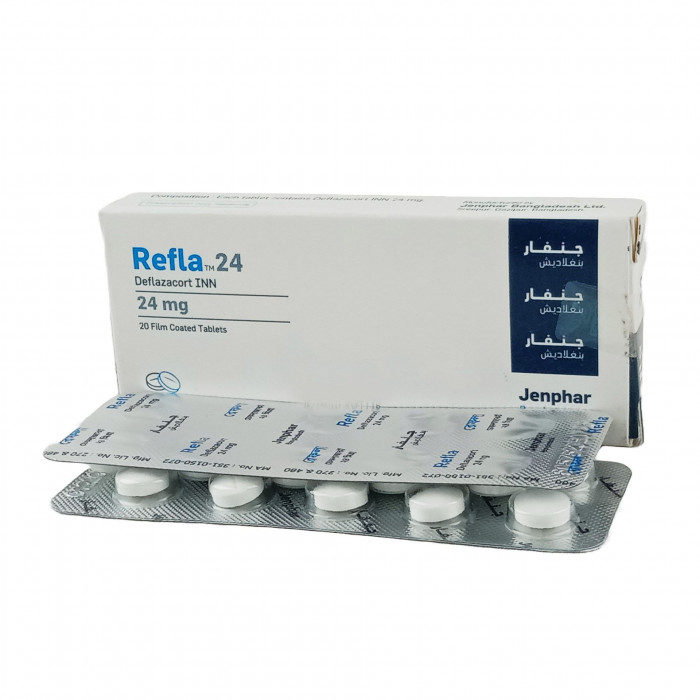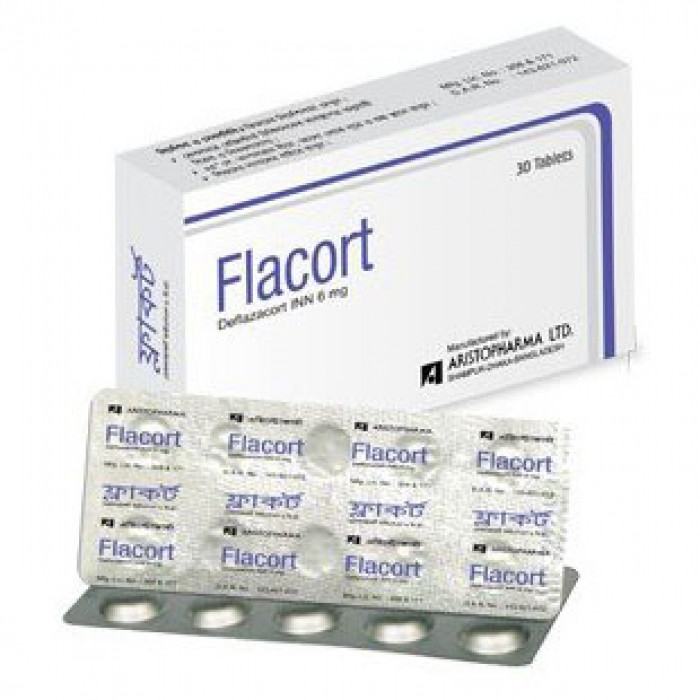
✔ 100% Authentic Product
👁️ Currently Viewing 3061
Deflazacort, a glucocorticoid, exhibits potent anti-inflammatory effects by inhibiting phospholipase A2, an enzyme involved in prostaglandin synthesis. It also suppresses immune responses by decreasing the release of pro-inflammatory immune mediators, thereby contributing to its immunosuppressive properties.
Discount
Price: ৳ 86
MRP:
৳
90
5%
Off

100% Genuine Products, Guaranteed

Safe & Secure Payments, Always

Fast, Secure & Efficient Delivery

Proper Packaging
 Cash on Delivery - All over Bangladesh
Cash on Delivery - All over Bangladesh Regular Delivery - 12-24 Hours, Dhaka City* Charge Tk.39-59
Regular Delivery - 12-24 Hours, Dhaka City* Charge Tk.39-59 Regular Delivery - 24-48 Hours, Other Cities* Charge Tk.99-110
Regular Delivery - 24-48 Hours, Other Cities* Charge Tk.99-110
🌙 রমযান অফার 🌙
 ফ্রি ডেলিভারিঃ - ৭৯৯ টাকা+ অর্ডারে, ঢাকা
শহরে
ফ্রি ডেলিভারিঃ - ৭৯৯ টাকা+ অর্ডারে, ঢাকা
শহরে ফ্রি ডেলিভারিঃ - ২৭৯৯ টাকা+ অর্ডারে, ঢাকার
বাহিরে
ফ্রি ডেলিভারিঃ - ২৭৯৯ টাকা+ অর্ডারে, ঢাকার
বাহিরে
📲 মোবাইল অ্যাপ অর্ডারে সাশ্রয় বেশী
-
Google Play Store থেকে ডাউনলোড
-
Apple Store থেকে ডাউনলোড
100% Genuine Products, Guaranteed
Safe & Secure Payments, Always
Fast, Secure & Efficient Delivery
Proper Packaging
 Cash on Delivery - All over Bangladesh
Cash on Delivery - All over Bangladesh Regular Delivery - 12-24 Hours, Dhaka City* Charge Tk.39-59
Regular Delivery - 12-24 Hours, Dhaka City* Charge Tk.39-59 Regular Delivery - 24-48 Hours, Other Cities* Charge Tk.99-110
Regular Delivery - 24-48 Hours, Other Cities* Charge Tk.99-110 ফ্রি ডেলিভারিঃ - ৭৯৯ টাকা+ অর্ডারে, ঢাকা
শহরে
ফ্রি ডেলিভারিঃ - ৭৯৯ টাকা+ অর্ডারে, ঢাকা
শহরে ফ্রি ডেলিভারিঃ - ২৭৯৯ টাকা+ অর্ডারে, ঢাকার
বাহিরে
ফ্রি ডেলিভারিঃ - ২৭৯৯ টাকা+ অর্ডারে, ঢাকার
বাহিরে- Google Play Store থেকে ডাউনলোড
- Apple Store থেকে ডাউনলোড
🌙 রমযান অফার 🌙
📲 মোবাইল অ্যাপ অর্ডারে সাশ্রয় বেশী
✅ Description:
Flacort is used in the management of a wide range of inflammatory and autoimmune conditions, including:
- Severe allergic and hypersensitivity reactions like anaphylaxis and asthma
- Rheumatoid arthritis, juvenile idiopathic arthritis, polymyalgia rheumatica
- Autoimmune disorders such as systemic lupus erythematosus, dermatomyositis, mixed connective tissue disorders (excluding systemic sclerosis), polyarteritis nodosa, and sarcoidosis
- Dermatological conditions such as pemphigus, bullous pemphigoid, and pyoderma gangrenosum
- Kidney disorders like minimal change nephrotic syndrome and acute interstitial nephritis
- Rheumatic carditis
- Inflammatory bowel diseases like ulcerative colitis and Crohn’s disease
- Ocular inflammations including uveitis and optic neuritis
- Hematological disorders such as autoimmune hemolytic anemia and idiopathic thrombocytopenic purpura
- Certain malignancies, including acute and chronic lymphocytic leukemia, malignant lymphoma, and multiple myeloma
- For immune suppression in transplant recipients
Use only as directed by a registered physician.
✔️ Uses of Flacort 6
- Severe allergic reactions
- Allergic conditions
- Asthma
- Cancer
- Rheumatic disorder
- Skin disorders
- Eye disorders
✔️ Dosage & Administration of Flacort 6
Adults
- Acute conditions: Up to 120 mg/day may be required initially.
- Rheumatoid arthritis: Maintenance dose typically ranges between 3–18 mg/day; titrate to the lowest effective dose.
- Bronchial asthma: Acute flare-ups may need 48–72 mg/day, which should be gradually tapered. For chronic asthma, adjust to the lowest effective maintenance dose.
- Other conditions: Doses are based on clinical need and typically converted at a ratio of 5 mg prednisone to 6 mg Deflazacort.
Children
Though clinical exposure in children is limited, dosing guidelines generally fall between 0.25–1.5 mg/kg/day depending on the condition. Alternate-day dosing may be considered to minimize side effects.
- Juvenile arthritis: 0.25–1.0 mg/kg/day (maintenance)
- Nephrotic syndrome: Start at 1.5 mg/kg/day, then taper
- Asthma: Initial dose of 0.25–1.0 mg/kg on alternate days based on potency ratio
Use only under the supervision of a licensed medical practitioner.
- Hepatic Impairment: Monitor drug levels and adjust dosage carefully.
- Renal Impairment: No specific dose adjustment required beyond standard corticosteroid precautions.
- Elderly: Monitor closely as corticosteroid side effects can have more serious consequences.
✔️ Discontinuation
For patients who have been on systemic corticosteroids (approx. 9 mg/day or more) for over 3 weeks, gradual tapering is required to avoid relapse and adrenal insufficiency.
✔️ Possible adverse effects include:
- Gastrointestinal disturbances, electrolyte imbalance, increased infection risk, and delayed wound healing
- Musculoskeletal issues like osteoporosis and myopathy
- Neuropsychiatric symptoms such as mood swings or psychosis
- Endocrine disturbances, including adrenal suppression
- Skin changes like striae, acne, and thinning
- Risk of thromboembolic events and cardiovascular complications, including post-MI myocardial rupture
✔️ Drug Interactions
Flacort is metabolized in the liver. Enzyme inducers like rifampicin, carbamazepine, phenobarbitone, and phenytoin may reduce its effectiveness, requiring dose adjustments.
Enzyme inhibitors such as ketoconazole may increase drug levels, possibly necessitating a lower maintenance dose.
✔️ Contraindications
- Hypersensitivity to Deflazacort or any component of the formulation
- Concurrent use with live virus vaccines
✔️ Pregnancy & Lactation
Pregnancy:
Deflazacort crosses the placenta. Prolonged or repeated use may result in fetal growth restriction. It should be used only when the potential benefits outweigh the risks.
Breastfeeding:
Although no direct data is available for Deflazacort, corticosteroids are excreted in breast milk. Doses up to 50 mg/day are generally considered safe. Higher doses may carry a risk of adrenal suppression in infants, though breastfeeding benefits often outweigh these risks.
✔️ Caution is advised in patients with:
- Cardiovascular issues (heart failure, hypertension, thromboembolism)
- GI conditions (gastritis, ulcerative colitis, diverticulitis, peptic ulcers)
- Diabetes or a family history of diabetes
- Osteoporosis, myasthenia gravis, or renal impairment
- Neuropsychiatric disorders (psychosis, epilepsy)
- Liver dysfunction, hypothyroidism, or cirrhosis
- Ocular herpes simplex due to potential corneal perforation
✔️ Storage
Store below 25°C in a cool, dry location protected from moisture and light. Keep out of children’s reach.
⚠️Disclaimer:
At ePharma, we’re committed to providing accurate and accessible health information. However, all content is intended for informational purposes only and should not replace medical advice from a qualified physician. Please consult your healthcare provider for personalized guidance. We aim to support, not substitute, the doctor-patient relationship.




